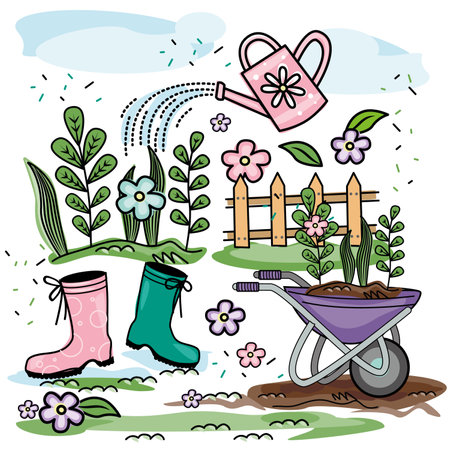Introduction to Zen Rock Gardens
Zen rock gardens, also known as karesansui or Japanese dry landscape gardens, have long been celebrated for their profound ability to cultivate tranquility and mindfulness. Originating from ancient Buddhist temples in Japan, these minimalist gardens use natural elements such as rocks, gravel, and carefully placed plants to symbolize larger landscapes and evoke a sense of peace. The raked gravel represents rippling water, while strategically positioned stones mimic mountains or islands. This artful simplicity invites contemplation and encourages a deeper connection with nature—values that align beautifully with sustainable living principles.
As more Americans seek serene escapes within their own backyards, the timeless design and philosophy of Zen-inspired rock gardens offer an eco-friendly way to transform outdoor spaces into peaceful sanctuaries. By adapting traditional Zen concepts to fit American landscapes and lifestyles, homeowners can create low-maintenance, water-wise environments that foster relaxation, self-awareness, and a mindful approach to everyday life. Embracing these sustainable practices not only enhances personal well-being but also contributes positively to the planet by reducing resource consumption and promoting harmony with the natural world.
Core Elements of a Zen-Inspired Rock Garden
Crafting a peaceful Zen-inspired rock garden for your outdoor living space starts with understanding its essential features. Each element plays a symbolic and practical role in fostering tranquility, reflection, and harmony with nature. To create an authentic yet sustainable Zen garden suited for the diverse climates across the United States, it’s important to make mindful material choices that respect both tradition and the environment.
Key Features of a Zen Rock Garden
| Element | Symbolism | Eco-Friendly U.S. Material Options |
|---|---|---|
| Rocks & Stones | Mountains, islands, permanence | Locally sourced fieldstones or recycled concrete pavers |
| Gravel or Sand | Water flow, impermanence, serenity | Recycled crushed granite, pea gravel from regional quarries |
| Moss & Ground Cover | Softness, renewal, lushness | Native moss varieties (e.g., sheet moss), drought-tolerant ground covers like creeping thyme |
| Water Features | Calmness, life force, reflection | Solar-powered recirculating fountains, rain gardens using local river stones |
Eco-Friendly Choices for Lasting Tranquility
Rocks and Stones: Instead of importing exotic rocks, consider using stones sourced from your own region. This reduces transportation emissions and blends your garden seamlessly with the surrounding landscape. Recycled concrete is another sustainable alternative that mimics natural stone while diverting waste from landfills.
Gravel and Sand: Gravel serves as the “sea” in Zen gardens—raked into calming patterns. Opt for recycled gravel or sand from local suppliers to minimize environmental impact. These materials provide excellent drainage and require little maintenance.
Moss and Ground Cover: Moss creates a cooling carpet effect and flourishes in shaded, moist environments. Select native mosses or resilient ground covers adapted to your climate zone; these require less watering and chemical inputs than non-native species.
Water Features: Incorporate water thoughtfully by choosing solar-powered fountains or designing rain gardens that capture runoff for irrigation. These solutions conserve resources while bringing soothing sounds and movement to your Zen retreat.
Sustainability Tips for U.S. Gardens
- Select drought-tolerant plants and materials suitable for your USDA hardiness zone.
- Avoid invasive species; opt for indigenous alternatives that support local biodiversity.
- If possible, repurpose existing materials from your property or community salvage centers.
- Design with permeable surfaces to help manage stormwater naturally.
Cultivating Mindful Outdoor Spaces
The core elements of a Zen-inspired rock garden are not only visually calming but also lend themselves to eco-conscious design practices. By prioritizing local materials and climate-adapted plants, you’ll create a sanctuary that is both peaceful for people and gentle on the planet.

3. Design Tips for American Backyards
Bringing Zen-inspired rock gardens into your American backyard is all about blending tranquil aesthetics with sustainable living. Whether you have a compact city patio or a sprawling suburban yard, you can create an oasis that both soothes the soul and honors the environment.
Embrace Natural Materials
Select locally sourced rocks, reclaimed wood, and native plants to keep your garden eco-friendly. River stones, gravel, and boulders can be arranged to mimic natural landscapes while reducing the need for water-thirsty grass lawns.
Layer for Serenity and Depth
Use layers of rocks, sand, and drought-tolerant ground covers like creeping thyme or blue fescue. This not only creates visual interest but also supports biodiversity. Raked gravel patterns add meditative elements and require no irrigation.
Integrate Water Wisely
If you’d like to include water features, opt for recirculating fountains or rain gardens that harvest stormwater. These touches echo Zen tradition while conserving resources in line with American sustainability goals.
Design for Every Space
Even small urban yards can host a Zen corner: use a raised planter box filled with pebbles, moss, and a single sculptural stone. For larger lots, carve out winding paths bordered by native shrubs and install a minimalist seating area using upcycled benches or stone slabs.
Low Maintenance, High Impact
Zen rock gardens are naturally low-maintenance—no mowing, minimal watering, and little need for chemical treatments. Choose hardy plants adapted to your local climate, and let fallen leaves decompose as mulch. This approach saves time and supports pollinators native to your region.
Personalize Your Sanctuary
Add wind chimes made from bamboo or recycled metal, place lanterns for soft evening light, or display found driftwood as art. Each element should reflect your personality while staying true to the mindful simplicity of Zen design—creating a peaceful retreat that’s uniquely yours and gentle on the planet.
4. Sourcing Local and Sustainable Materials
When creating Zen-inspired rock gardens for peaceful outdoor living spaces, sourcing local and sustainable materials is a fundamental step toward environmental responsibility. Choosing rocks, gravel, sand, and wood from regional suppliers not only reduces the carbon footprint associated with transportation but also supports local economies and preserves the unique ecological character of your area.
Why Local Matters
Using locally sourced materials helps to minimize the environmental impact of your garden project. Transporting heavy stone or wood over long distances requires significant fossil fuel consumption, leading to increased greenhouse gas emissions. By selecting materials native to your region, you are reducing these emissions and conserving energy. Moreover, local stones and plants blend harmoniously with the surrounding landscape, creating a truly authentic and visually cohesive Zen retreat in your backyard.
Benefits of Sustainable Material Choices
| Sustainable Practice | Ecological Benefit | Community Impact |
|---|---|---|
| Locally Quarried Stone | Lowers transportation emissions; preserves natural habitats elsewhere | Supports small businesses; strengthens local industry |
| Reclaimed Wood & Gravel | Reduces landfill waste; minimizes resource extraction | Promotes circular economy; fosters green jobs |
| Native Plants & Mulch | Conserves water; sustains pollinators and wildlife | Enhances biodiversity; reflects regional beauty |
Sourcing Responsibly: Tips for Gardeners
If you’re planning your own Zen-inspired rock garden, start by visiting local landscaping yards or stone suppliers who prioritize sustainable practices. Ask about the origin of their products and seek out certifications that verify responsible sourcing. Opt for reclaimed or salvaged materials whenever possible—these can add character to your garden while keeping usable resources out of landfills. By making mindful choices, you create an outdoor oasis that not only nurtures personal well-being but also contributes positively to the health of your community and planet.
5. Mindful Maintenance and Ecological Benefits
Zen-inspired rock gardens are celebrated not only for their tranquil aesthetics but also for their low-maintenance qualities, making them a perfect fit for eco-conscious homeowners seeking peaceful outdoor retreats. Unlike traditional lawns or flowerbeds that require frequent watering, mowing, and fertilization, Zen gardens emphasize natural materials like gravel, stones, and drought-tolerant plants. This minimalistic approach significantly reduces the need for water and chemical inputs, aligning with sustainable living practices that are increasingly valued across the United States.
Low-Maintenance Strategies
One of the core principles of Zen gardening is mindful simplicity. By opting for native or adapted plant species such as succulents, mosses, or ornamental grasses, you can create an outdoor space that thrives with minimal intervention. Regular raking of gravel or sand not only maintains the garden’s appearance but also offers a meditative routine that supports mental well-being. Choosing hardy ground covers and mulching with natural materials further discourages weeds and reduces upkeep time—freeing you to enjoy your peaceful space rather than laboring over it.
Water Conservation Practices
Water scarcity is a growing concern in many parts of the U.S., making water-wise landscaping more important than ever. Zen rock gardens excel in this area by relying on xeriscaping techniques that minimize irrigation needs. The careful placement of rocks and gentle slopes helps direct rainwater to plant roots while preventing runoff and soil erosion. Incorporating rain barrels or drip irrigation systems can further boost efficiency, demonstrating how traditional Japanese design harmonizes with modern American sustainability goals.
Biodiversity and Personal Well-Being
Beyond resource conservation, Zen-style gardens contribute to local biodiversity by providing habitats for beneficial insects, pollinators, and small wildlife. The inclusion of varied textures—like stone clusters, moss patches, and native shrubs—creates microclimates that support different organisms throughout the seasons. This ecological richness not only enhances your garden’s resilience but also deepens your connection to nature, fostering a sense of stewardship and mindfulness. Ultimately, tending to a Zen-inspired landscape nurtures both environmental health and personal tranquility, embodying a holistic vision for sustainable outdoor living in America.
6. Creating Your Own Outdoor Sanctuary
Transforming your backyard into a Zen-inspired rock garden is an opportunity to create a peaceful sanctuary that balances natural beauty, mindfulness, and environmental responsibility. Whether you’re working with a spacious lawn or a cozy urban patio, start by observing the existing landscape and envisioning how you want to feel in your outdoor space. Embrace the Zen tradition of simplicity—choose natural materials like river stones, reclaimed wood, and native plants to minimize environmental impact while fostering harmony with your surroundings.
Mindful Design for Lasting Tranquility
Focus on intentional design elements such as winding gravel paths, raked sand patterns, or strategically placed boulders to encourage meditation and reflection. These features not only honor classic Japanese garden aesthetics but also provide low-maintenance solutions that conserve water and reduce the need for chemical treatments. Remember, every element should serve both form and function—native grasses can support local pollinators, while carefully selected rocks help control erosion naturally.
Inviting Peace Through Sustainable Choices
Go green by sourcing locally quarried stones and drought-tolerant plants adapted to your climate. Rainwater harvesting systems or permeable pathways can further reduce your garden’s ecological footprint. Consider adding a small bench made from reclaimed materials where you can relax, meditate, or simply enjoy the sound of wind rustling through bamboo.
Nurturing Community and Well-being
Your Zen-inspired rock garden isn’t just a personal retreat—it’s also a way to connect with friends, family, and neighbors who share your appreciation for nature and sustainability. Host outdoor gatherings centered around mindfulness practices or eco-friendly gardening workshops to inspire others in your community.
By weaving together Zen principles and sustainable practices, you’ll create an outdoor oasis that offers peace of mind today and preserves natural resources for generations to come. Let your new sanctuary become a daily reminder to live intentionally, care for the planet, and find serenity right outside your door.


